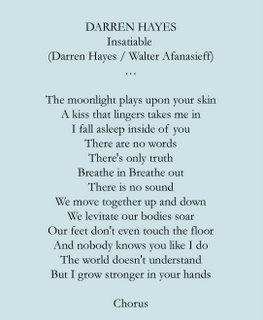Word of the Day: Mondegreen
 One of the things I love most about the internet is the proliferation of sites devoted to song lyrics. I love music, but I love words even more. So when I listen to a song, I always want to know what it is they're really saying.
One of the things I love most about the internet is the proliferation of sites devoted to song lyrics. I love music, but I love words even more. So when I listen to a song, I always want to know what it is they're really saying.Hilarious examples of misheard lyrics are common, and Sylvia Wright has coined a word for them: mondegreens. This neologism is itself a mondegreen, and immortalizes the heroine of one of S.W.'s childhood mistakes. She wrote in a 1954 article in Harper's, "The Death of Lady Mondegreen," about listening as a child to a Scottish folk ballad, a line from which ran, "They hae slain the Earl Ammuray/And Lady Mondegreen." The line is actually, "They hae slain the Earl of Moray/And laid him on the green."
I myself am guilty of countless such errors. One of the songs on my favorite playlist is "Insatiable," by Darren Hayes. In the second stanza, he seems to be singing, "There are no words / There's only Jews." Now, I know that can't be right, and I've looked it up--that second line is actually "There's only truth"--but I still hear it my way. That's the thing about mondegreens. They're very persistent, even after their hapless creator has been exposed and publicly ridiculed in music class, the family sing-a-long, or the church choir.
Somewhere at this moment, a child is sitting on a log under the pines, chorusing, "Merrily, merrily, merrily, merrily, Like a butter stream." Somewhere at this moment, an earnest citizen stands in a stadium, patriotically intoning, "José, can you see, by the donzer lee light?" Somewhere at this moment, an aging baby boomer is cruising down the highway, radio blaring, belting out, "Doughnuts make your sad eyes blue!"
Thousands of new mondegreens are created daily, as we consumers of language try to turn avalanches of new aural information into meaningful utterance. As my Uncle Eddie used to say, "Isn't it wonderful?" Mondegreens remind us that it is not only the artist who creates, but his audience as well.

